|
The encounter between Mahler and Freud
Paulus Manker
The turning of the century was the best possible breeding
ground for the development of the psychoanalysis, with all
the hidden feelings and desires - all that what Alma did not
live according to. And there we are at the point where your
work on Alma actually started, with Gustav Mahler. One of
the most interesting events in Mahler´s life was probably
that notorious meeting between him and Sigmund Freud in that
Dutch Spa, in Leyden. We don´t have too many sources
about it, but it´s obvious that something very important
for Alma and for Gustav happened there through Freud´s
"instant" analysis, saying: "Go back, go home,
fuck your mother, and accept him as your father!" - and
it worked.
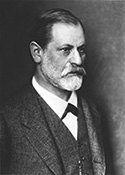 |
 |
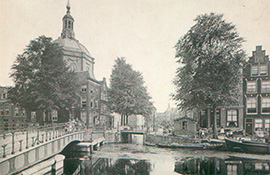 |
 |
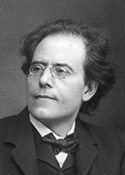 |
| |
|
|
|
|
| Sigmund Freud (ca.1900) |
|
City of Leiden, Southern Netherlands |
|
Gustav Mahler (1909) |
Joshua Sobol
It is a very interesting encounter between Mahler and Freud,
between those two "monsters" who lived in the same
town, and probably crossed one another on the street a few
times without ever meeting one another, and having a conversation
with one another before. Until that moment came when Gustav
simply needed Sigmund very badly, and was ready to take leave
from his rehearsals in Munich, and run to see him in Leyden,
even for those few hours. As I see those four hours of the
meeting in Leyden, they are very intriguing. I once thought
of writing a play only about that meeting, there is certainly
material for a play there. I had a very crazy idea how to
do it, and there is only a hint of it in the scene now: it
is the moment after they finish that kind of ridiculous pschoanalysis
which Freud treats as a joke. In my mind Freud couldn´t
think seriously that in four hours you could psychoanalyse
a man who comes to you with the problem of impotence, and
says: "I can´t make love to my wife, and I need
your help!" What could you say- Sprinkle some salt? Freud
was not a fool, he knew that you cannot make a psychoanalysis
in four hours.
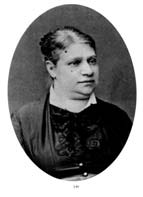 |
 |
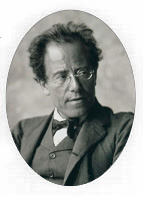 |
 |
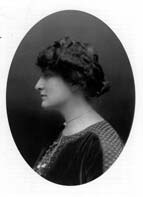 |
| |
|
|
|
|
| Mahler's mother Marie |
|
Gustav Mahler |
|
Alma Mahler |
So my idea was to have Freud, in a way, saying to him: "You
want an instant psychoanalysis? I can make it to you in half
an hour, if you want." We know that they walked around
in the streets of Leyden, and Freud says that he never met a
person with such a deep insight into psychoanalysis as Mahler
had. And Mahler probably furnished him all the material, telling
him the story of his childhood, how he first got initiated to
music, and the feeling of power that music gave him, the fact
that it gave him superiority over his tyrannical father, that
it gave him a central place in the familiy. And yet there was
that terrible relationship, this painful relationship between
the father and the mother. The father being violent, and abusing,
and beating the mother, and the mother crying, and running out
of the house, and little Gustav listening to that frivolous
folkmusic on the street, and from that moment mixing frivolous
motives with deeply tragic themes in his music. I think that
Mahler almost furnished Freud with an explanation.
But what I dared to do in the play is to allow Freud to come
out with some "ethnic" explanations to Mahler´s
music, and with a kind of an almost "cultural" psychoanalysis
by saying: "Listen, my good friend, it has nothing to do
with your personal biography. That is a special style of your
music. It has a lot to do with your origins, with the fact that
you are Jewish. And as a Jew you have no respect for the sublime
if it is not mixed with the terrestrian, with the everyday life,
with the basic moments of life." Freud says in the play
that we Jews know that God is crazy, and that he refuses to
undergo a psychoanalysis. So, how can we take him seriously?
We cannot. And that´s why, whenever we speak about God
we mix a joke into it, and we dismiss him with a joke sometimes.
And he says: "That´s what you are doing with your
music, because you feel that we are living in a world where
the grotesque and the sublime are mixed together, and there
is no way to seperate one from the other." And he tells
Mahler: "Be yourself. For once accept yourself. Stop trying
to be a different person, stop trying to become different. Stop
making efforts. Be what you are." And in a way he says
to him: "You are her father, o.k. You are twenty years
her senior. She lost her father when she was a baby. She remained
fixed on the figure of her missing father. Go, and fuck her
as her father would have done to her if he dared to do, and
if she dared to do what she wanted to do with her missing father."
And the moment he gives him that kind of license we hear that
something very wonderful happens, a miracle happens, and Alma
tells Gropius later that she had a great time with Mahler during
his last few months. What I tried to do in that scene, in the
meeting between Freud and Mahler, is to go beyond the banalities
of psychanalysis. First of all to establish the banal way of
dealing with such a meeting, which all the biographers of Freud
and of Mahler did, and then saying: Listen, this is the banal
version, now let´s go a step further, and see what Freud
could have said. And I think that the importance of the meeting
is, that Freud could have said to him: "Listen, you are
Jewish, you are twenty years her senior, your music is influenced
by your origins, your life is influenced by your origins, and
go back, and be yourself, and that´s it, and then everything
will fall into place." That´s how I see the meeting
between the two of them.
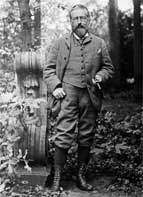 |
 |
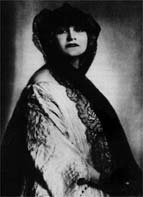 |
 |
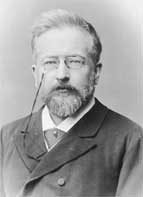 |
| |
|
|
|
|
| Emil Jakob Schindler, Alma's father |
|
Alma Mahler |
|
Emil Jakob Schindler, Alma's father |
Paulus Manker
Not only that Freud allowed Mahler to be Alma´s senior
father to replace the old Schindler, he also told him that
in having made Alma suffering all the time she unconsciously
became in his mind the replacement of Mahler´s own mother,
too.
Joshua Sobol
That´s right. What he meant was probably: "That
young woman, Alma, she is now the age of your mother as you
remember her from your childhood. When you were a child your
mother was in the age of Alma now. So go and make love to
your mother." And, in a way, trespass a certain taboo,
the biggest one: incest. And there is something incestuous
in that relationship of Mahler and Alma. What Freud was doing,
was giving him license for incest. "If there is something
wrong in your relationship it´s that she takes you for
her father, you take her for your mother, and that´s
why you can´t make sex with one another. So now admit
that you want to fuck your mother, lets her admit that she
wants to be screwed by her father, and go, and have sex with
one another, and that´s it." Of course, it´s
done in a very humoristic way in the play. I don´t think
it is so easy sometimes. But maybe when an authority like
Freud tells you: "This is what you want, this is what
you wish, go and do it!", you go, and you do it, I don´t
know? |
|
